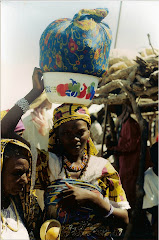 One-hour north of Monrovia, in Margibi County, lies Firestone – all 117,000 acres of it.
One-hour north of Monrovia, in Margibi County, lies Firestone – all 117,000 acres of it.  The largest rubber plantation
The largest rubber plantation  in the world,
in the world,  Firestone is deeply embedded in the economic fabric of Liberia. We decided to spend a morning there, to check out this massive natural resource embroiled in controversy.
Firestone is deeply embedded in the economic fabric of Liberia. We decided to spend a morning there, to check out this massive natural resource embroiled in controversy. 

Liberians seem to have a love-hate relationship with Firestone, which was granted to Liberia in a concession agreement in 1926. Firestone employs some 7000 Liberians, all of whom live with their dependents on the Plantation. This creates somewhat of a captive community, distant from major towns and cities and reliant on Firestone services.
As a member of the International Labor Rights Forum email list, I have received several “Stop Firestone” emails in my inbox. The charges are grave and verified:

* Impossible-to-meet quotas for Firestone workers who tap trees for latex
* Child labor (children must carry two 70-pound buckets for miles; this occurs when rubber tappers take their families to work to meet quotas)
* Cramped and unsanitary living conditions
* Unhealthily long work hours (it takes an estimated 21 hours to meet one’s daily quota)
* Salaries below a living wage
* Environmental degradation through dumping of toxic chemicals
* Employees forced to apply pesticides without protection
Firestone employees have bravely been trying to unionize and the Firestone Agricultural Workers Union of Liberia (FAWUL) recently received an AFL-CIO Human Rights Award.
During our trip, the Public Relations Officer – a Liberian who had been born in the Firestone Hospital – had nothing but glowing descriptions of Firestone… for instance, Firestone employees and their dependents have unlimited access to Firestone schools, hospitals, bus routes, etc. His written introductory speech was filled with confident, complimentary, and defensive remarks about his organization.

Firestone employees then gave us a tapping demonstration. I asked about daily quotas, and the representative answered circuitously that each worker is responsible for 500 trees per day, and that the quota is not fixed, but rather depends on the productivity of the trees. I asked about working hours. Though earlier he had said that trees must be tapped in the wee hours of morning and that full buckets were collected in the evening, he answered that work days were 8 hours long. Interesting.

We were given a tour of the 200-square-mile plantation, which involved driving on well-paved roads through beautiful lush forest and emerging tree farms.
 We saw the current hospital (which was impressive by local standards, yet overcrowded), the impressive hospital-in-construction (which, during the war, was attacked and looted), a high school (with a memorable library and bio lab), and the timber processing factory.
We saw the current hospital (which was impressive by local standards, yet overcrowded), the impressive hospital-in-construction (which, during the war, was attacked and looted), a high school (with a memorable library and bio lab), and the timber processing factory.In the United States, it is a traditional rhetorical device to say: “I was talking to a taxi driver, and he said…” to show that one is tapped into “the word on the street.” For me in Liberia, the four to five taxi drivers we regularly charter are not merely a device, but friends—and a source of a lot of good information.
I asked two of our Liberian taxi drivers about Firestone, and they had opposing opinions. Paul said that Firestone workers always seemed to be stirring up trouble, that they lived better than most Liberians, that their rice was cheaper, and that the services provided to them were unappreciated gifts.
Yet, Dollo, who drove us to Firestone, spent much of our journey there warning us that it was a corporation that abused the rights of workers, and he lamented the working and living conditions.
 He said he’d rather live in the rural interior of Liberia than land a job on the plantation.
He said he’d rather live in the rural interior of Liberia than land a job on the plantation. 
After our official tour, Dollo gave us a “real” tour, and drove us through the market, and around a neighborhood where workers actually lived. He wanted to show us the real conditions, as he knew there were many routes intentionally not taken our official Firestone Public Relations tour. He also showed us the mansions where Firestone executives live, and gestured toward their golf course.
There are always several sides to every story and many roads untaken, and Dollo’s initiative encouraged me to be sure to venture through the unexplored routes.










2 comments:
So what's the verdict? Just because most Liberians are living beneath the poverty line, is this a reason for firestone to fall short of international corporate standards? Interestingly, on Firestone's website, in the section of community development, they only said that they were committed to good corporate citizenship nationally and regionally (i.e. in manufactoring plants in Latin America) - no mention about committment internationally in production areas.
economic social activist please donot write books only
your expertise to erradicate poverty is needed here in the nation of liberia
who is making firestone give justice other than responcible kind and genteler americans
dyncorp is working in liberia for firestone only this secreat is not lost on any thinking individual
Post a Comment